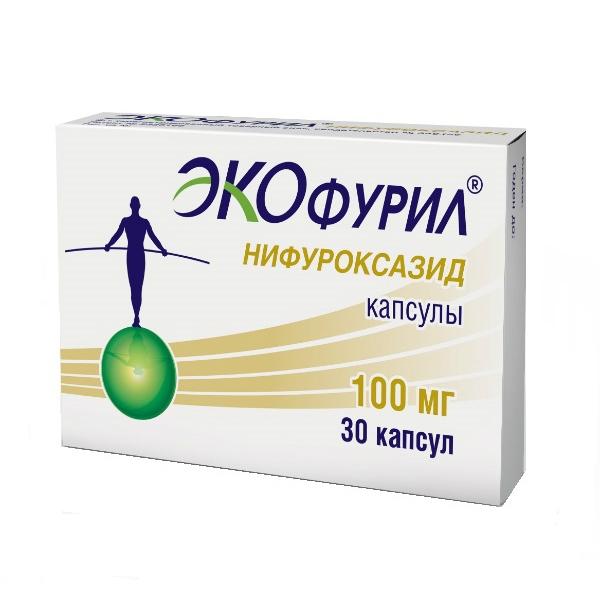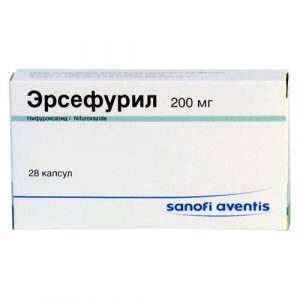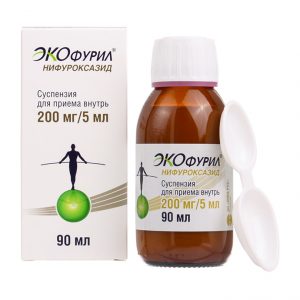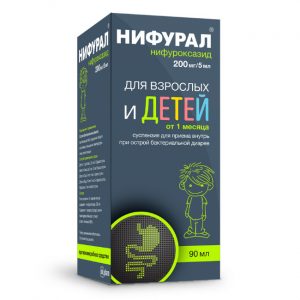Description
Release form
Capsules.
Packing
30 pcs.
Pharmacological action
Broad-spectrum antimicrobial agent – derivative of 5-nitrofuran.
Used to treat infections of the gastrointestinal tract. Nifuroxazide blocks the activity of dehydrogenases and inhibits the respiratory chain, the tricarboxylic acid cycle and other biochemical reactions in the bacterial cell. Destroys membranes of sensitive bacteria, reduces the production of toxins by microorganisms. Activates immunity, increases phagocyte activity and complement titer.
Effective against gram-positive microorganisms:
Staphylococcus spp.
Streptococcus spp.
and gram-negative microorganisms:
Salmonella spp.
Klebsiella spp.
Enterobacter spp.
Escherichia coli
Shigella spp.
Proteus spp.
Haemophilus influenzae
Campilobacter spp.
Edwarsiella spp.
Citrobacter spp.
Vibrio cholerae
Yersinia enterocolitica.
Nifuroxazide does not affect the state of normal microflora of the human intestine. In acute bacterial diarrhea, intestinal eubiosis is restored. When infected with enterotropic viruses, it prevents the development of bacterial superinfection.
Pharmacokinetics
After oral administration, nifuroxazide is practically not absorbed in the gastrointestinal tract and has no systemic effect. It exhibits antibacterial activity against sensitive bacterial species only in the intestinal lumen. Unchanged, it is excreted by the intestines. The elimination rate depends on the dose of the drug and the motility of the gastrointestinal tract.
Indications
Acute and chronic diarrhea of infectious origin (without signs of helminthic invasion).
Chronic colitis and enterocolitis.
Contraindications
Hypersensitivity to nifuroxazide, other components of the drug, other derivatives of 5-nitrofuran. Sucrose / isomaltase deficiency, fructose intolerance, glucose-galactose malabsorption.
Children’s age up to 3 years (for this lekforma).
Pregnancy and lactation
data on adverse effects on the fetus during pregnancy. If necessary, with caution, the drug can be prescribed to pregnant women and women who are breastfeeding.
Special instructions
When treating diarrhea concomitantly with nifuroxazide therapy, rehydration therapy (oral or intravenous) must be performed in accordance with the patient’s condition and the duration of diarrhea.
Alcohol is not allowed during nifuroxazide therapy.
Effect on the ability to drive vehicles and perform work that requires an increased concentration of attention and speed of psychomotor reactions
The drug does not adversely affect the ability to drive vehicles and / or other mechanisms.
Composition
active substance: nifuroxazide 200.0 mg.
excipients: lactulose – 300.0 mg, microcrystalline cellulose – 58.0 mg, potato starch – 18.0 mg, magnesium stearate – 6.0 mg, sucrose to obtain a capsule content of 630.0 mg.
hard gelatin capsules No. 00 [gelatin (up to 100%), water (14-15%), cap:
crimson dye [Ponceau 4R] (0.079801%), patent blue dye (0.00165%), sunset sunset dye (0.093301%), titanium dioxide (0.813158%) case: quinoline yellow dye (0, 583356%), sunset sunset dye (0.002565%), titanium dioxide (0.974035%)].
Dosage and Administration
Take orally.
Adults and children over 7 years of age: 1 capsule of 200 mg 4 times a day, (800 mg / day).
Children 3-7 years: 1 capsule of 200 mg 3 times a day, (600 mg / day).
The duration of nifuroxazide therapy is no more than 7 days.
Side effects
Allergic reactions.
Drug Interactions
Data on the interaction of nifuroxazide with other drugs has not been published.
Overdose
There are no specific symptoms of overdose. Standard emergency measures are recommended.
Storage conditions
In a place protected from moisture and light, at a temperature not exceeding 25 ° C.
Keep out of the reach and sight of children.
Shelf life
5 years.
Deystvuyushtee substance
Nifuroksazid
Conditions of Release from drugstores
Without Prescription
dosage form
capsules
£ ¡, Russia




